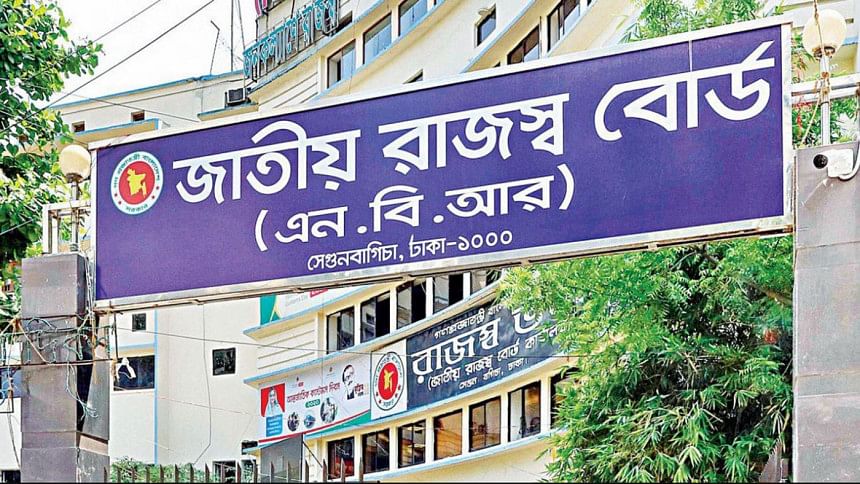NBR launches five-year Customs Strategic Plan

The National Board of Revenue (NBR) has prepared the Customs Strategic Plan (CSP) 2024-2028, aiming to facilitate trade, enhance revenue collection, and modernise its operations to support businesses and economic growth.
The five-year plan, structured around the four key pillars of revenue management, trade facilitation, border security, and organisational development, sets clear targets and timelines to drive efficiency in customs administration.
"This comprehensive plan reflects the country's unwavering commitment to fostering a business-friendly environment and bolstering the trading community to drive economic growth," Finance Adviser Salehuddin Ahmed said in the report.
The new CSP aims to fully implement the Bangladesh Single Window (BSW) by 2027, integrating customs systems with port authorities, transport logistics, the tax administration and stakeholders engaged in international commerce.
The plan targets to integrate participating agencies into the BSW system by late 2025, develop and operationalise all modules by mid-2027, and reach full-scale implementation by the end of 2027.
As part of this plan, the NBR partially launched the much-awaited national single window on January 2 at a hotel in Dhaka. Initially, the tax administration brought seven out of 19 customs agencies under the system.
The NBR also aims to automate manual tasks related to customs by 2026, introduce artificial intelligence-driven risk assessment by 2027, and establish a central monitoring system for customs data.
This digital platform aims to eliminate bureaucratic bottlenecks, reduce processing times, and create a seamless customs clearance system for businesses.
The customs authorities, as part of efforts to make Bangladesh a regional trade and logistics hub, want to introduce pre-arrival processing for imported goods by the end of this year.
It also targets full automation of bonded warehouse management by 2026.
Besides, the NBR introduced an electronic platform on Monday within the Automated System for Customs Data World to enable its Authorised Economic Operators (AEOs) to submit customs-related documents.
The AEO status, which is an internationally recognised standard, is granted by customs authorities to compliant businesses and allows them to enjoy expedited customs clearance and other benefits.
The NBR hopes this system is likely to facilitate faster customs clearance for compliant businesses, thereby reducing time and costs.
The NBR announced that nine out of the 17 firms with AEO status would be able to use the green channel for overseas trade. The remaining must comply with certain regulations to become eligible for green channel clearance.
The CSP 2024-28 is also looking at modernising tariff structures and enhancing collaboration with value-added tax (VAT) and income tax authorities.
The customs administration aims to update customs valuation databases by the third quarter of this year and digitally integrate VAT, income tax, and customs systems by the end of this year.
The NBR plans to implement a risk-based post-clearance audit system by mid-2026 to prevent revenue leakages.
To combat smuggling and illicit trade, the CSP introduces electronic cargo tracking, advanced risk management tools, and non-intrusive inspection (NII) technology.
The plan said the nationwide expansion of NII technology at major land and seaports is scheduled for mid-this year, with the introduction of an Advanced Passenger Monitoring System planned for late 2025.
AI-based customs fraud detection mechanisms are expected to be deployed by early 2027, according to the plan.
The NBR said implementation of the CSP 2024-28 is expected to significantly reduce customs clearance times, lower compliance costs, and create a more predictable trade environment for businesses.
The revenue administration said it will introduce a results-based monitoring system, ensuring quarterly progress reviews and a mid-term evaluation by 2026.
With a focus on digitalisation, transparency, and international best practices, the aim is to establish a world-class trade facilitation framework by 2028, according to the plan.
"The launch of this Strategic Plan marks a pivotal step forward in our mission to modernise and streamline customs operations," NBR Chairman Md Abdur Rahman Khan said in the report.
"Through the successful implementation of this plan, we aim to support economic growth, strengthen national security, and enhance the overall trade experience for all stakeholders."

 For all latest news, follow The Daily Star's Google News channel.
For all latest news, follow The Daily Star's Google News channel. 



Comments